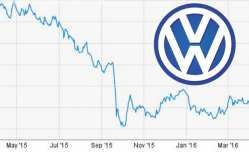
— Volkswagen is fighting an investor lawsuit that could remove another $10.7 billion from VW's corporate checking account as a German court weighs arguments from both sides.
The group of plaintiffs claim Volkswagen failed to tell investors about how the emissions scandal would negatively affect shares which fell by 37 percent of their value.
More than 1,600 claims allege investors likely would have sold their shares earlier if the automaker would have admitted it rigged diesel vehicles with illegal emissions-cheating software called "defeat devices." Other investors claim they wouldn't have purchased shares at all if they would have been told about the illegal activity.
Attorneys say many of the claims won't last long due to statute of limitations laws, but the judge says the complicated case has a long and winding road before any solid numbers can be reached.
The plaintiffs claim VW should have informed investigators about the illegal software by June 2008 and the automaker admits it took evasive measures to keep the public and emissions regulators out of the loop. But VW claims nothing was done to intentionally cheat investors and the automaker allegedly did nothing to violate disclosure regulations.
The judge says he already has questions about how damages could or should be calculated and how much share prices would have differed if the automaker would have disclosed its scheme earlier.
Attorneys for Volkswagen argue management didn't believe it needed to notify investors of the emissions problems because the automaker didn't think the Environmental Protection Agency (EPA) would serve official notices of federal violations.
According to VW, it was already in talks with government regulators concerning a settlement when the automaker was surprised by official violation notices. Volkswagen also says other automakers had been in trouble with the EPA before but the government didn't issue violation notices in those situations.
The automaker has tangled with investors in court for other cases including one Volkswagen recently agreed to settle for $48 million.




